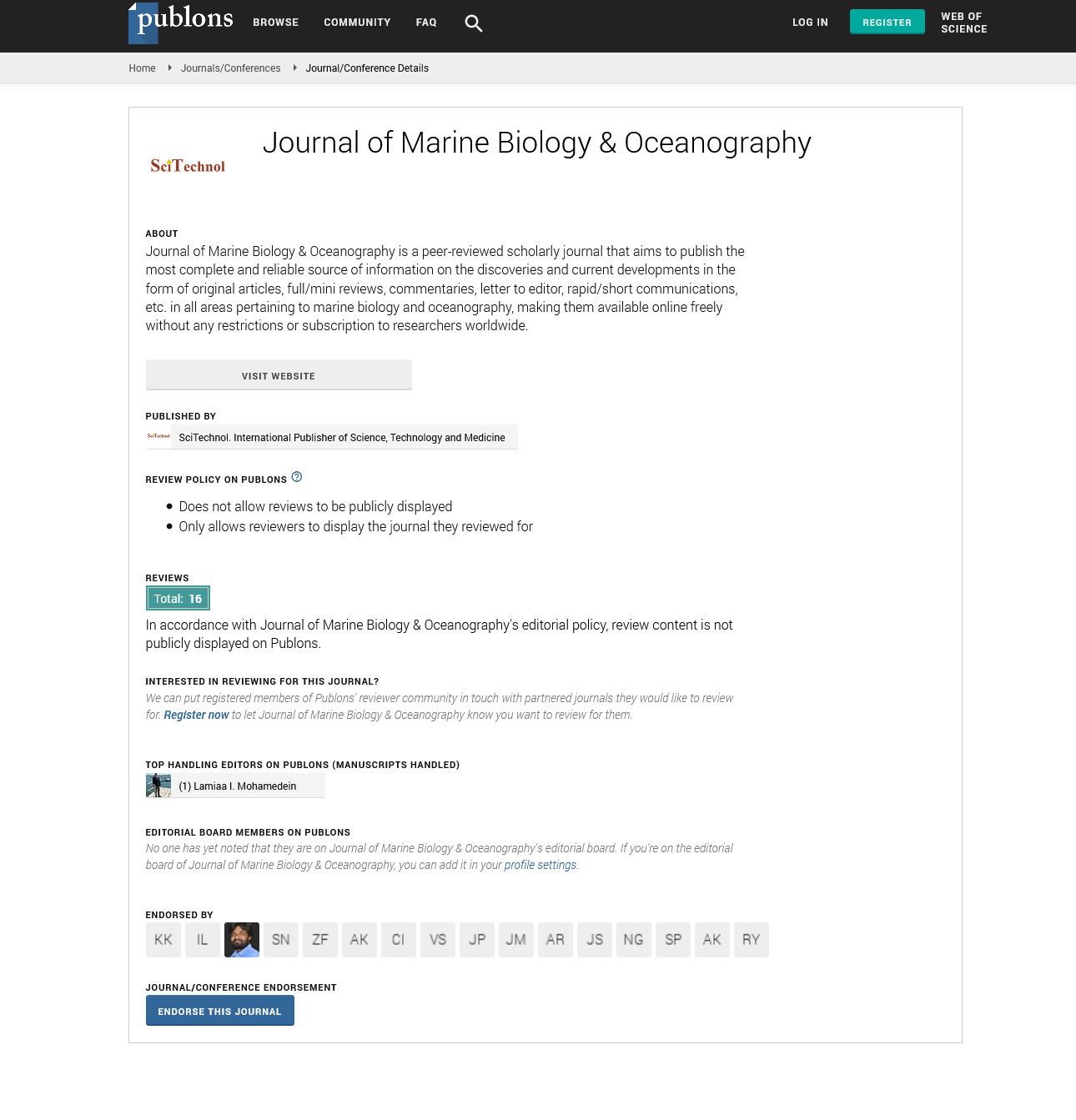Opinion Article, J Mar Biol Oceanogr Vol: 12 Issue: 2
Advancements in Marine Engineering: Navigating the Future of Ocean Technology
Liu Jiabin*
Department of Ocean Science and Technology, Dalian University of Technology, Liaoning, China
*Corresponding Author: Liu Jiabin
Department of Ocean Science and Technology
Dalian University of Technology
Liaoning, China
E-mail: liujiabin@dut22.cn
Received date: 22 March, 2023, Manuscript No. JMBO-23-98504;
Editor assigned date: 24 March, 2023, PreQC No. JMBO-23-98504 (PQ);
Reviewed date: 07 April, 2023, QC No. JMBO-23-98504;
Revised date: 14 April, 2023, Manuscript No. JMBO-23-98504 (R);
Published date: 21 April, 2023, DOI: 10.4172/2324-8661.1000262
Citation: Jiabin L (2023) Advancements in Marine Engineering: Navigating the Future of Ocean Technology. J Mar Biol Oceanogr 12:2.
Description
The field of marine engineering has come a long way in recent years, with rapid advancements in technology revolutionizing the ability to explore, utilise, and conserve the vast oceans that cover more than 70% of the planet's surface. From sophisticated naval architecture and offshore structures to underwater robotics, renewable energy, and environmental monitoring, marine engineering plays a vital role in shaping the future of ocean technology. One of the significant advancements in marine engineering is in naval architecture, where cutting-edge design tools and simulation techniques are used to optimise the performance, efficiency, and sustainability of marine vessels. Advanced computational methods, including Computational Fluid Dynamics (CFD) and Finite Element Analysis (FEA), enable engineers to model and simulate the behaviour of ships and offshore structures in various environmental conditions, leading to more robust and efficient designs. These advancements have resulted in the development of more sophisticated ships and floating structures that are capable of withstanding extreme weather conditions, reducing emissions, and improving safety and stability at sea.
Offshore engineering has also seen remarkable advancements, particularly in the design and construction of offshore platforms for oil and gas exploration and renewable energy production. Advanced materials, such as high-strength steels and composites, are used to build offshore platforms that can withstand harsh marine environments, including corrosive seawater, strong currents, and extreme weather conditions. Furthermore, innovations in subsea technology, such as Remotely Operated Vehicles (ROVs) and Autonomous Underwater Vehicles (AUVs), have transformed offshore operations, making them safer, more efficient, and environmentally friendly. Underwater robotics has been a game-changer in marine engineering, enabling us to explore and monitor the ocean depths with unprecedented precision and accuracy. ROVs and AUVs are equipped with advanced sensors, cameras, and communication systems that allow for remote monitoring and data collection in real-time. These robotic systems are used for various applications, including deep-sea exploration, underwater inspections, environmental monitoring, and resource mapping. They have greatly expanded the understanding of the ocean and its ecosystems, leading to new insights into marine biodiversity, geology, and climate change impacts.
Renewable energy is another area that has seen significant advancements in marine engineering. With increasing global demand for clean and sustainable energy, marine engineers are developing innovative technologies for harnessing the power of the ocean. Offshore wind farms, wave energy converters, and tidal power systems are being designed and constructed using state of the art engineering techniques, materials, and installation methods. These technologies have the potential to provide a significant source of renewable energy while reducing reliance on fossil fuels and mitigating climate change impacts.
Environmental monitoring and conservation are also essential areas where marine engineering is making a difference. Marine engineers are involved in the development of monitoring systems, such as buoys, sensors, and data collection platforms, that enable real-time monitoring of ocean conditions, including temperature, salinity, acidity, and pollution levels. These systems help us understand the impact of human activities on marine ecosystems and inform policy and management decisions for the sustainable use and conservation of marine resources. Despite the remarkable advancements in marine engineering, challenges remain. The harsh and unpredictable nature of the ocean environment, regulatory frameworks, and economic constraints pose significant hurdles to the development and implementation of marine technologies.
Conclusion
Marine engineering has witnessed significant advancements in recent years, shaping the future of ocean technology. From naval architecture and offshore engineering to underwater robotics, renewable energy, and environmental monitoring, marine engineers are at the forefront of developing innovative solutions for sustainable marine operations. With continued studies and innovation, marine engineering will continue to play an important role in unlocking the potential of the world's oceans and addressing challenges such as climate change, resource extraction, and conservation.
 Spanish
Spanish  Chinese
Chinese  Russian
Russian  German
German  French
French  Japanese
Japanese  Portuguese
Portuguese  Hindi
Hindi 
